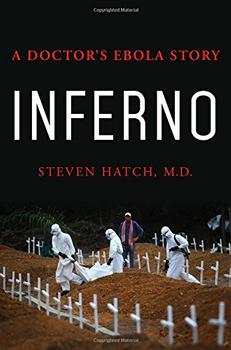Summary | Excerpt | Reviews | Beyond the Book | Readalikes | Genres & Themes | Author Bio

A Doctor's Ebola Story
by Steven Hatch
Härtl's tweet in response was nonchalant: "No need to overblow something which is already bad enough."
MSF took another turn, pointing out that it was hard to "overblow" the Zaire Ebolavirus, as it had now been identified: "This is the most deadly strain of the Ebola virus. It kills 9 out of 10 patients."
Almost immediately Härtl shot back, tweeting, "Don't exaggerate. #Ebola can kill up to 90% of those infected and in this particular outbreak fatality rate is less than 67%."
MSF's view of the matter would ultimately prove to be the more prescient of the two. However, Härtl's final statistic of the case fatality rate for the West African outbreak did basically hold, which must have provided him some comfort in retrospect.
What MSF had sensed, and what at least some of the people at WHO were oblivious to, was that this particular outbreak found itself in the perfect storm of destitute local governments, shoddy surveillance infrastructures, byzantine international bureaucracies, and societal observances such that it could be silently moving through the countryside unbeknownst to these groups, waiting for its chance to deliver a blow with crushing force. Yet that isn't how it played out initially. March turned into April, and with it came a decline in cases. Guinea, which hit a peak in the first weeks of April, started to trend down. Liberia, which had seen a case or two in a village called Foya in the northwestern corner of Lofa County, could find nothing else. Sierra Leone still hadn't registered a case at all. Härtl was on his way to being vindicated.
Then came May, and Ebola did indeed roar back. The second wave, which would continue on through the next several months, was on a trajectory that had never been seen before. In a way, Härtl's original statement was, strictly speaking, still correct: There never had been an outbreak larger than a couple hundred cases. What was happening in West Africa would be an n of 1.
This was unprecedented. Sierra Leone saw its first case, and almost immediately those cases multiplied with frightening speed. Liberia's previous flirtation with Ebola in March and April looked like a tremor before the real earthquake. And, of course, Guinea's tally increased at the same rate. Ebola always had remained a localized event, but now it threatened to engulf three countries with a total population of about twenty-two million people simultaneously, with cases breaking out hundreds of miles from one another. This was no longer a single outbreak by previous definitions but had instead become a meta-outbreak where dozens of local outbreaks were taking place, and all in one of the least-prepared areas that could be imagined. Yet hardly anyone in the outside world was fully aware of this, even by late May. By contrast, the Kikwit outbreak of 1995, primed as it was by the popularity of Preston's and Garrett's books, had become front-page news much more rapidly.
* * *
Emile's father, Etienne Ouamouno, bore witness to the loss of his family, never having been infected despite having lived and breathed and slept right next to the virus for days on end, only belatedly aware of the danger it had posed to him. Whether the fact that he escaped its clutches makes him feel lucky or the opposite is a question I suspect he ponders often. A few brave souls from the international media came to Meliandou in the midst of the outbreak to interview him, and he spoke of how the events of the previous year had affected his outlook. "When I think about them, I feel very sad," he said to the BBC in a video recorded in late 2014. "The pain is too much. I just can't bear it. But then, I have to say to myself, 'they've gone.' I just have to accept it and move on." He says this and then quickly looks away into the distance.
Excerpted from Inferno by Steven Hatch. Copyright © 2017 by Steven Hatch. Excerpted by permission of St. Martin's Press. All rights reserved. No part of this excerpt may be reproduced or reprinted without permission in writing from the publisher.
Your guide toexceptional books
BookBrowse seeks out and recommends the best in contemporary fiction and nonfiction—books that not only engage and entertain but also deepen our understanding of ourselves and the world around us.